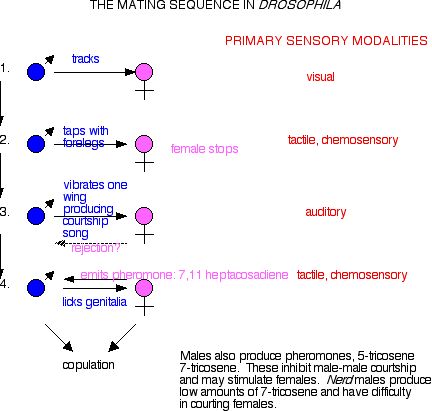
Genetics of Drosophila Mating
Many genetic mutations affect fruit fly, Drosophila melanogaster, mating behavior. Male behavior is inhibited by the gene Nerd and by fruitless and enhanced by Voila, . Female receptiveness to mating is impaired by genes such as dissatisfaction, spinster and chaste. The sequence of courtship behavior and the sensory modes used during courtship help in developing an understanding of how these genes might affect courtship and mating,

Mutations which affect the visual system reduce male mating success by making it difficult for males to find females. Auditory mutants make females less receptive to mating because they cannot hear the male courtship song. Chemosensory mutants can affect the performance of either sex in courtship.
Mutations may affect peripheral sensory processes, such as Voila, which seems to affect chemosensory cells in the male's front legs. However, mutations which affect processes in the brain are more interesting, as they can give insight into the organization of the central nervous system and the generation of complex behaviors like mating.
While "executive neurons" which may coordinate mating have not been identified, control centers for some processes are known. By using molecular techniques to generate flies which are male/female mosaics, investigators have been able to determine that feminization of otherwise male brains often results in no change in mating behavior. Feminization of parts of the chemosensory processing center in the brain, however, impairs the ability of males to discriminate males from females. Males in which this part of the brain is feminized court males as well as females.
Yamamoto, D. and Y. Nakano. 1999. Sexual behavior mutants revisited: molecular and cellular basis of Drosophila mating. Cell. Mol. Life Sci. 56:634-646.
page 4-*
copyright ©2001 Michael D. Breed, all rights reserved